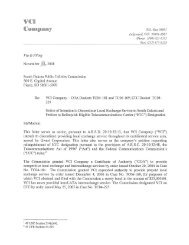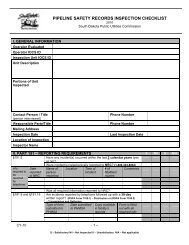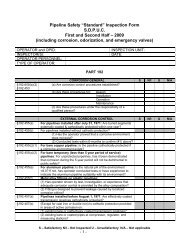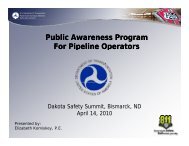Exhibit 1 - South Dakota Public Utilities Commission
Exhibit 1 - South Dakota Public Utilities Commission
Exhibit 1 - South Dakota Public Utilities Commission
Create successful ePaper yourself
Turn your PDF publications into a flip-book with our unique Google optimized e-Paper software.
DOCKET NO. RMU-2009-0009<br />
PAGE 14<br />
ICAP also recommended that the Board and Consumer Advocate be notified<br />
of an HVAS situation involving negotiations between carriers and the filing of a<br />
proposed tariff. The Board does not find that it is necessary to notify the Board or<br />
Consumer Advocate prior to the commencement of HVAS negotiations since the<br />
Board would not be a party to those negotiations and Consumer Advocate would not<br />
normally be a party either. However, if the negotiations are successful and an HVAS<br />
tariff is filed, the Board and Consumer Advocate would receive notice of such a filing<br />
pursuant to the current rules governing the filing of tariffs. Alternatively, if the<br />
negotiations fail, the Board and Consumer Advocate would also receive notice if the<br />
parties seek Board resolution of the HVAS dispute pursuant to Iowa Code § 476.11.<br />
The Board will not revise the proposed rule to include this requirement.<br />
RIITA expressed concern that large carriers might ignore attempts by smaller<br />
carriers to enter negotiations over an HVAS situation. RIITA recommended that<br />
small carriers be allowed to file their HVAS tariffs after they provide notice. RIITA<br />
argues that if a carrier objects to an HVAS tariff, the standard process for challenging<br />
a tariff should be followed, including the collection of the proposed rate on a<br />
temporary basis, subject to refund if the proposed rate is not approved.<br />
However, QCC and Consumer Advocate recommended instead that the rules<br />
establish a 60-day timeframe for completing the HVAS negotiations and suggested<br />
that if negotiations are not successful, the parties could then petition the Board for an<br />
expedited proceeding. The Board finds this recommendation to be reasonable, as it<br />
strikes a balance between the need for time for negotiations and the need to prevent
















